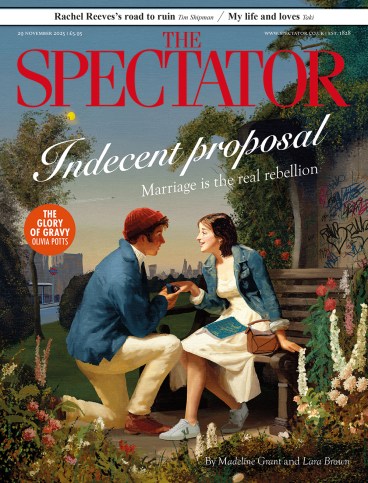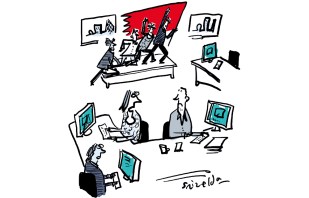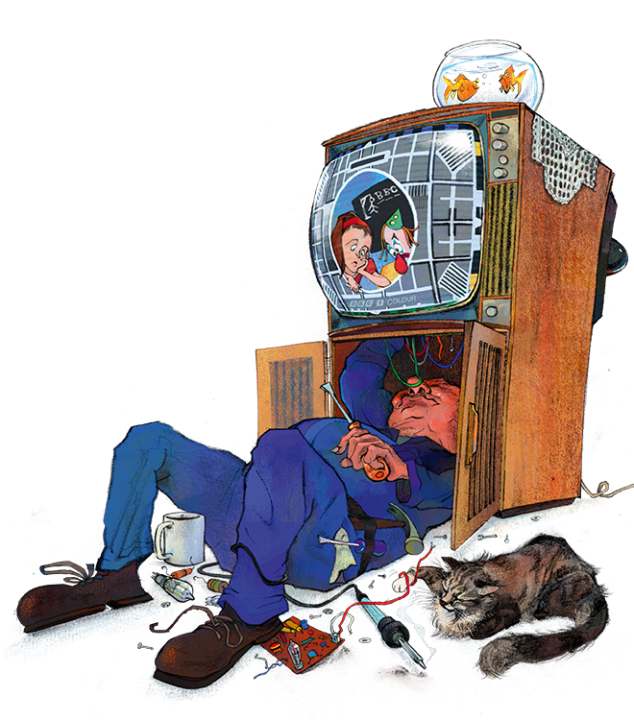
For quite a few members of the House of Commons culture, media and sport committee, the answer to the claims of left-wing bias against the BBC could be annulled by the simple expediency of firing the only supposedly right-of-centre person within the corporation, Robbie Gibb. It is a curious logic that the left employs. This is especially true in the case of Labour’s Rupa Huq, the MP for Ealing Central and Acton (which, I am told, is in London), who believes that people can only be ‘black’ if they subscribe to the same idiotic world view as herself.
Ol’ Rupa has twice been in trouble for racism: once when she said Kwasi Kwarteng wasn’t properly black and once when, after resigning from Labour Friends of Israel (which she had joined, presumably, as a not entirely convincingly disguised fifth columnist), she was accused by members of not having divested herself of anti-Semitic comments. She has also spent a hefty amount of time insisting that the BBC is actually biased to the right and that the Palestinian cause was serially under-represented by the corporation.
I just don’t know what you can do with people like that, people who wilfully refuse to see the reality of a situation simply because it contradicts their political viewpoints – and yet it is a fairly common ailment on the far left. It would be gratifying to think that the voters in her constituency might take notice of her apparent madness and get rid of her at the next election, but seeing where her constituency is, one suspects she has a safe seat for life.
All the while the BBC execs repeated the mantra that the corporation was not ‘systemically’ or ‘institutionally’ biased to the left. All of them are of course either mistaken or lying, or feathering their beds with a certain fluffy sophistry and disingenuous semantics. What perhaps they mean when they say that the BBC isn’t biased is that its Westminster news coverage is, by and large, scrupulously balanced. I have no problem with them holding this belief, indeed clinging to it; sure, I think Chris Mason and, before him, Laura Kuenssberg were admirably even-handed in reporting parliamentary affairs. But that is drawing the definition of ‘bias’ and where it might exist so narrowly that it almost loses the point entirely. All those executives know full well that the BBC draws its staff from within the ever-widening pool of liberal-left middle-class humanities graduates.
These people do not, as Tony Hall once pretended, hang up their political opinions on the coat pegs when they enter Broadcasting House. There are not any coat pegs capacious enough, for a start. They don’t ‘hang them up’ because, as I’ve written here before, they do not think they are opinions at all, they just think they are being ‘nice’. Nice, kindly, compassionate – and the people who disagree with them are thus nasty. And mean. Now, this extends throughout news and current affairs and all the way into drama, comedy, review programmes, light entertainment and even, bizarrely, sport, where you might still hear football commentators praising sides which ‘take the knee’ before the start of a game, in memory of the much-missed George Floyd.
Even the very best of its programming succumbs to this adherence to a political and cultural viewpoint
You can hear this bias every time you switch on Radio 4 – especially if you switch on in the middle of one of its afternoon plays. You can see it in the BBC’s weird obsession with drag queens; you might spot it in the sorts of questions asked on Pointless and the ‘protected characteristics’ of the competitors. The bias bellows its name out of your TV set whenever the BBC tries to make a documentary about that strange foreign land, the past (and especially – sorry about the spoiler – if you are daft enough to watch its new programme Civilisations: Rise and Fall. There’s a great section on how brilliant refugees are and why you just can’t have enough of them).
Even the very best of the corporation’s programming succumbs to this tainting, this adherence to a political and cultural viewpoint which most importantly is a viewpoint, and secondly, which does not commend itself to a large tranche of the country. Interestingly, especially averse are the people who actually watch the BBC and pay the licence fee: the elderly and the conservative-minded. The young don’t watch the Beeb.

In a sense it is the only issue that matters and it is the one which they all – even ‘centrist dad’ Michael Prescott – deny exists. And yet I am prepared to wager a large amount of money that they know it exists, but that to admit as much now would be to signal the death knell for the BBC (or at least for the licence fee). So they have decided to do what they always do and circle the wagons, seeking refuge in the fact that the parliamentary reportage – because it is so heavily patrolled – is close to pristine and forgetting that every morning producers turn up for the Today programme with ideas for the editorial meeting which devolve directly from their own prejudices: the stuff that has occurred to them. Trust me, I’ve been there. So has this magazine’s editor.
Addressing this is the only recourse left to the BBC, in reality: attracting a politically diverse workforce. The chairman of the BBC, Samir Shah, knows this very well indeed and if he were to be pushed out it would hasten the end of Auntie. In the meantime, the staff of the corporation cleave to their world view and their outrage that right-wingers are trying to subvert their beloved organisation. They’re probably commissioning Rupa Huq to do a documentary about it right now – and would do so without grasping the irony, without grasping the point. The excellent Caroline Dinenage, chair of the culture, media and sport committee, did her best – but the BBC remains in la la land. They like it there.









Comments